Darien sent in a question a while back about a line very early in Xenogears.
During the insufferable rock-paper-scissors minigame at the beginning of Xenogears on the PSX, one thing the RPS man sometimes says when you beat him is “oh-my-gobrino.” Oh my what now? I can’t say I’m familiar with that expression. Can you shed any light?
I’ve only played the demo for Xenogears – I think it came with Final Fantasy VIII? I can’t recall – but the fact that this is so early in the game made it easy for me to look into, so let’s take a look!
First, here are screenshots of the line in question:
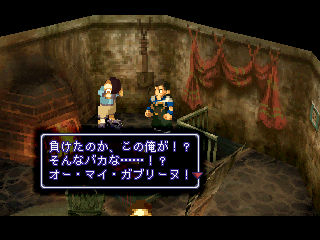 | 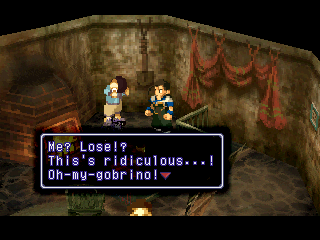 |
| Xenogears (Japanese release) | Xenogears (English release) |
And here’s the text side-by-side:
| Japanese Version (basic translation) | English Version |
| I lost?! Me?! This can’t be…! | Me? Lose!? This’s ridiculous…! |
| Oh my Gabrine! | Oh-my-gobrino! |
At first, I thought the “oh-my-gobrino” line in English must’ve been a weird localization or in-joke, or possibly a way to avoid using the word “god” (although don’t you fight God later in the game?), but it looks like it’s in the original Japanese script too, more or less.
So that still leaves the question of, “What the heck is gabrine/gabrino?” but since I’ve never played anything more than the demo and this intro, maybe it makes more sense to others. My hunch is that this guy just says crazy things in crazy ways… he’s a pretty quirky character to begin with, after all. I did do some quick searching on Japanese sites but couldn’t find anything, so this is sadly still a mystery, I guess.
If anyone has any ideas on what this line is about, please share in the comments!


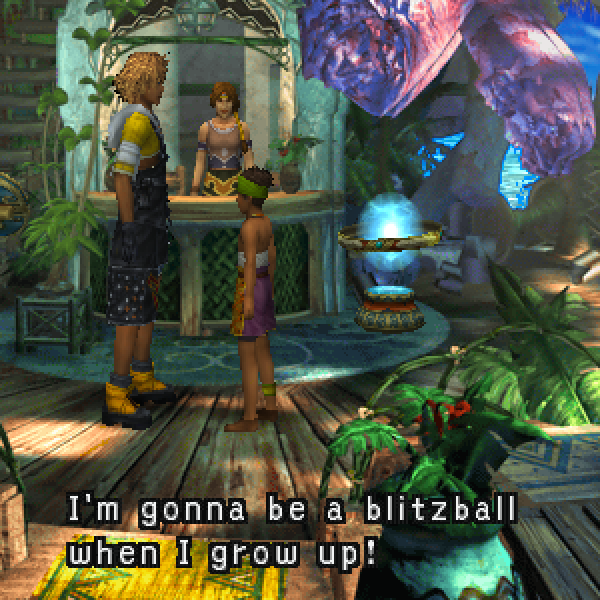
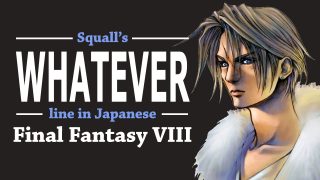
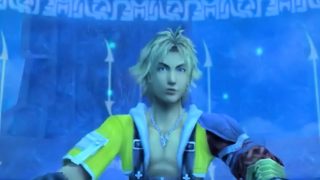
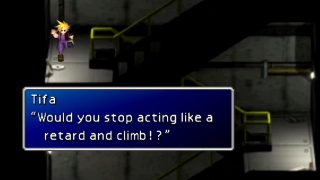
I think Gabreanu is a French family name. I don’t really know of that helps but it’s all I got >_>
Yeah, the direct Japanese to English text doesn’t seem a whole lot more clear, is it?
Then again, I never played Xenogears, so it might make sense in context.
And now we shall wonder what a Gobrino/Gabrine is.
I looked in my copy of Xenogears PERFECT WORKS and it was not listed as a vocabulary item/significant name there, so the odds of it being mistranslated later in the script is nil. :/
Maybe a Japani-Frenchified take on “goblin”? Goblinne?
My first thought was also that it was a cutesy way of writing around the word “God,” but you’re right — the game has a bit of a God fetish, very much including said battle.
I would suggest not looking up “ガブリーヌ” in google image search. Apparently “Gaburi-nu” is a pretty NSFW scantily clad cat girl/robot thing.
Thanks for solving the mystery, and for the warning!
I get the same results searching for Gabrine.
Is this Gabrine old enough to be the reference in Xenogears, though? And what is it, exactly?
All I could find was a twitter account, but it’s in Japanese.
I’m fairly certain that it’s newer than Xenogears. Here’s more info: http://en.wikipedia.org/wiki/Busou_Shinki
” scantily clad cat girl/robot thing”
SOLD!
Weirder still is that in the Japanese version, the guy is apparently saying “Oh my” in English (although written in katakana), which would give he impression that “gaburine” is also supposed to be some sort of Western word.
I always thought he was saying some made up Italian word personally. XD
Tell me if I’m wrong:
Normally, when transcribing an English word into katakana, if the word ends in a consonant, the word will have appended to its end an “u” (choice of indefinite article intentional and not a typo) for most consonants or an “o” for “t” or “d”, but the one exception to the rule is when the word ends with “n”, in which case 「ン」 is used.
Which leads me to believe that the original word must have already ended with an “u” sound even before being transcribed. Otherwise, it would probably have been 「ガブリーン」.
I am aware that 「ン」 is not always pronounced like the English “n” (only before alveolar consonants like “s” or “t” does it take that pronunciation).
Does the above sound accurate, or is there something I am missing? Do the rules change when importing words from a language other than English?
Yeah, a lot of European language words/names ending with an “n” sound often get katakana-ized with a ヌ at the end – for example, here’s a quick look at French women names: http://www.worldsys.org/europe/french-female-names/
It goes beyond just that, but yeah, that’s why I romanized it the way I did.
So is it up to the reader whether to pronounce it GabrEEN or GabrEENAY?
With the way it’s written in Japanese, the E is silent.
Especially since it’s written GA-BU-RI-I-NU, not GA-BU-RI-I-NE.
For the record, you fight Deus. I’m a little fuzzy, because it’s been 6 years, but I don’t think they ever use the word God. At the least the English word “God”. They use Deus. And people get crucified. And all kinds of biblical references. But they never use God.
Krelian does say, at the end of the game, that he’s leaving to go be with God.
There’s some neat info about that specific localization issue here: http://kotaku.com/5794922/how-one-man-stopped-square-enix-from-letting-gamers-kill-yahweh
Given this article, I feel like the Japanese staff are the type to randomly stick in-jokes into the script. This line is probably something similar.
Technically, Deus (Called that in the Japanese as well, though there’s Yabeh references as well in the Perfect Works and in the English) is closer to the Gnostic Demiurge than the traditional Judeo-Christian conception of God. But not many people are familiar with Gnosticism. The Wave Existence is similar to the Gnostic conception of the Source or true creator.
The fight itself is against “Deus,” it’s true, but the game uses the word “God” a ton. I’m presently looking at “Ol’ man Bal” telling me this crazy thing:
“They say that humans and god lived together in a paradise in the sky. With god’s protection, there was no fear of death, and natural disasters were entirely unknown. Then one day, the humans ate a forbidden fruit which gave them incredible wisdom. But god drove mankind from the paradise for their sin. Bitter at having been driven out of paradise, humans used the wisdom they had gained to make giants. With these giants, they planned to challenge god himself. But god poured his wrath down on them. All who defied god were destroyed. But god himself did not escape unharmed. Taking paradise with him, the wounded god buried himself deep beneath the ocean to sleep for eons. Before going to sleep, god used his remaining power to create right-hearted humans to live on this planet. These people are said to be… our ancestors.”
That’s nine “god” appearances all in one bit of dialogue. It’s pretty common. Also, there’s the amazing word “right-hearted,” which probably deserves its own LOL entry. 🙂
That is a lot of God in one paragraph. And a direct reference to Christianity, too. And this is after they changed Yahweh’s name, too.
Rather interesting, I must say. I find it somewhat strange that they only changed one name yet left in about everything else.
The game’s pretty much a localisation gold mine; it’s not totally incoherent like Final Fantasy 7 — or especially Tactics — but it’s full of typos (consistently uses “sight” for “site”), extremely odd word choices (fossicker?), bizarre formatting, and gibberish like the gobrino. If you ever get a spare eight or nine years, it’s probably worth looking in to. 😉
I know that one of the sight-site pairs – the one in the desert town very early on – was a deliberate pun. I think the worst thing about the -translation- was “all” the weird typographical -choices-.
You sir are not incorrect about the weird use of -text decoration.-
Reading that Katakana, I think they might have been going for someone self-censoring. It’s almost like he’s saying “Oh my Go-brngh!”, as if he was going to say “oh my God” but at the last moment just converted it into the sort of incomprehensible mess of noise that is a frustrated grumble. It’s about the only interpretation that makes any sense to me, anyway, and makes a fair bit of sense in context (which, as any translator can tell you, is the single most important aspect in how you choose to translate something).
I like this idea. I’m incompetent to judge its accuracy, but the psychology behind it sits well with me.
Hello again, Mato! Been a while since you last updated. What have you been up to?
According to Ancestry.com, Gabrine is the name some people took from the name Gabrini. Maybe this will help?
Well there’s ton of religious references in FF4 from Cain to the Tower of Babel.
Speaking of the Tower of Babil, when you get to it in Legends of Localazation, will you translate Golbez’s childhood that was added in the DS remake?
I’ve played Xenogears and I would say it’s less a reference to God, but rather to the “Hobgob” type enemies that are common around the area. Lahan is the first place you start out in the game, and the enemies you encounter are typical low-level enemies, among them Hobgobs.
The game seems to make a couple of jokes about them, such as being able to obtain “Hob Meat” and “Gob Jerky” which you can sell to certain markets (and make a profit through an amusing profiteering scheme later on – that is, until the NPCs catch on). Xenogears does indeed love its philosophical religious references, but it also has its own quirky sense of humor too that’s completely unrelated to the subject.
Don’t forget that the “B” is sometimes used to represent “V”. Does something like Gavrine, Gavrino, Gavurine, Gavurihnu, Gavlihne, Gavlihnu, … and similar have a meaning that fit it?
Oh Mai Gaburiinu!
Hi there, I know this is probably super old but I am currently researching some stuff to do a Neckbeardish Analysis stream of Xenogears. Apparently ガブリーヌ was a character in an NHK kids anime airing around the time called はりもぐハーリー (Harimogu Harley or Harley Spiny) it ended in June of 1997 and Xenogears was released in February of 1998. Gabrine was a crocodile character on the show, it was a slice of life kind of thing with various animals. I’m going to have to track either a few episodes with her in them in original Japanese dub, or the Spanish one. I’m wondering if either someone in Xenogears staff may have worked on some episodes, maybe their kids watched it or they did sort of thing. I’ll have to check the staff lists more closely for each title, the anime and game respectively to see if there are any staff who worked on both titles or for some connection. Near as I can tell this is probably the best connection given the time and all that. Or maybe one of the staff members had a crush on the seiyu, Chiyako Shibahara. Who knows. If I find anything else, I will report back here. :V
Kunihiko Tanaka was the character designer in Key the Metal Idol which Chiyako Shibahara also voice acted in. I’m probably grasping at straws but that’s the only tie in I can find to Harimogu Harley and Xenogears :V
also if it’s not apparent, Kunihiko Tanaka was also the character designer in Xenogears. I think at most it’s just a fun reference without combing through episodes of Harimogu Harley.